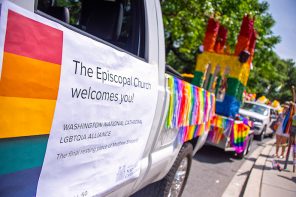Last week, the Episcopal Church considered two prominent measures regarding gay and lesbian couples and clergy at its General Convention. The church lifted a de facto moratorium on ordaining gay and lesbian bishops, and voted to give bishops wide latitude with regard to local clergy blessing same-sex unions, particularly in states where same-sex marriage is legal, authorizing them to provide a “generous pastoral response” to gay and lesbian couples.”
These measures were largely responses to rapidly changing public opinion and shifts in the political landscape on gay and lesbian issues. For example, when the Episcopal Church General Convention last met in 2006, same-sex marriages were legal in only one state, Massachusetts; just three short years later, same-sex marriages are legal in six states, each with sizable Episcopal populations.
Despite explicit affirmations expressing the desire to stay in “deep communion” with the wider Anglican Church, several prominent conservative Anglican leaders in other parts of the world have accused the American church of choosing to “walk apart” from the wider community. While it is difficult to measure the accuracy of those assertions, a recent nationwide study of Episcopal clergy makes one thing clear: the American General Convention is not walking apart from the opinion of its own clergy. According to the Clergy Voices Survey conducted by Public Religion Research,* Episcopal clergy strongly support both the ordination of gay and lesbian clergy and performing same-sex marriages in states where they are legal.
First, Episcopal clergy are highly supportive of the idea that “God has called and may call” to ministry gays and lesbians in committed lifelong relationships.  Nearly three-quarters (72%) of Episcopal clergy say that gays and lesbians should be eligible for ordination without special requirements. About 1-in-4 (23%) say that only celibate gay and lesbian people should be eligible for ordination, and only 5% say gay and lesbian people should not be eligible at all.
Nearly three-quarters (72%) of Episcopal clergy say that gays and lesbians should be eligible for ordination without special requirements. About 1-in-4 (23%) say that only celibate gay and lesbian people should be eligible for ordination, and only 5% say gay and lesbian people should not be eligible at all.
The views of Episcopal clergy are largely consistent with the views of clergy from most mainline denominations. Among clergy in the seven largest mainline Protestant denominations, all but two register majority or plurality support for ordaining gay and lesbian clergy with no special requirements. Episcopal clergy express stronger support than every other denomination except the United Church of Christ (UCC). Among the two denominational exceptions (two of the larger mainline Protestant denominations), United Methodist and American Baptist clergy, only 33% and 28% respectively support ordination of gays and lesbians. Overall, 46% of mainline Protestant clergy say that gays and lesbians should be eligible for ordination without any special requirements.
Second, by a nearly 2-to-1 margin, Episcopal clergy disagree with the statement, “Even if it were legal, I would not be willing to perform a civil union or marriage for a same-sex couple” (59% disagree vs. 31% agree). As a matter of general policy, nearly half (49%) of Episcopal clergy support same-sex marriage, 37% support civil unions for same-sex couples, and only 13% say there should be no legal recognition for same-sex relationships. Episcopal clergy are also strongly supportive of other rights for LGBT families and individuals, such as adoption rights, hate crimes laws, and workplace discrimination protections.
Like other mainline Protestant clergy, Episcopal clergy also report that their views on lesbian, gay, bisexual, and transgender (LGBT) issues are evolving in more progressive directions. Close to half (48%) of Episcopal clergy report that their views on LGBT issues are more liberal today than they were a decade ago. About 4-in-10 (41%) say their views have not changed, and only 14% say they have become more conservative.
The Clergy Voices Survey also offers evidence that the evolution in the Episcopal Church is not merely driven by external changes. Fully 8-in-10 Episcopal clergy agree (56% strongly agree) that “the gospel message requires full inclusion of gay and lesbian members in the life of the church.” These new positions by the Episcopal church, allowing clergy to preside at the marriage ceremonies of their gay and lesbian parishioners and opening the way to ordination and all leadership roles for gay and lesbian clergy, can be seen as the result of the confluence of societal change, theological conviction, and the need, as one of the resolutions puts it, for a “generous” and “renewed pastoral response by this church.”
*Note: The authors were the principal researchers for the Clergy Voices Survey, the largest survey every conducted among mainline Protestant clergy. The survey was conducted by mail in 2008 among a national random sample of senior clergy serving congregations in the seven largest mainline Protestant denominations. The survey contained over 250 separate questions and generated 2,658 respondents with a response rate of 44%. Full results of the study can be found here.




